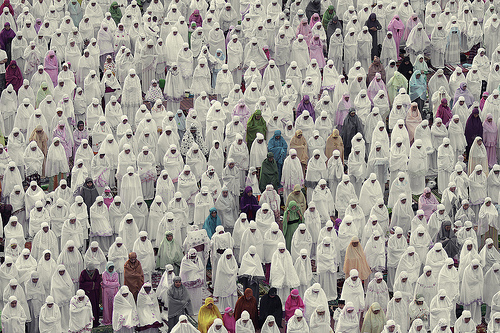

CAIRO – Muslims in Southeast Asian are among the most devout in the world, being the most enthusiastic followers of the five pillars of Islam, including Zakah, prayers and fating, a new survey has found.
“Annual almsgiving, which by custom is supposed to equal approximately 2.5% of a person’s total wealth, is almost as widely observed as fasting during Ramadan,” the Pew Research Center said in a new survey cited by the Wall Street Journal on Monday, August 27.
“In Southeast Asia and South Asia, the median of roughly nine-in-ten Muslims say they performed Zakah.”
The survey, which included 35,000 Muslims worldwide, focused on the performance of the five pillars of Islam; Shahadah (declaration of faith), prayer, Zakah (almsgiving), fasting and hajj.
It found that Muslims in Southeast Asia were more enthusiastic than those in Africa, Asia, Europe and even the Middle East in upholding most of these pillars.
The poll, which included about 5,000 people from the region, showed that Muslims of Indonesia, Malaysia and Thailand were often among the most enthusiastic followers of some of the five pillars of Islam.
Some 98% of Indonesians said they pay Zakah annually, followed by 93% of Malaysians and Thais.
Those were among the three highest rates for charity in the world.
In other Muslim communities, less than 80% of those surveyed paid Zakah.
An earlier study released by Pew research center has found that Muslims make up around one fourth of the world’s population and are mostly concentrated in Asia.
It found that Muslims make up 23 percent of the world’s 6.8 billion people, the sweeping majority of them are Sunnis.
According to the study, based on data from 232 countries and territories, Asia is home to nearly 20 percent of the global Muslim population.
It showed that the Middle East and North Africa have 315 million Muslims, about 20 percent of the world’s Muslims.
One-fifth of world Muslims (300 million) was found to be living in non-Muslim countries.
Enthusiastic Muslims
The comprehensive survey found that Southeast Asian Muslims are more enthusiastic about other pillars of Islam, such as fasting and daily prayers.
While most of the Muslim world embraces the fasting of the holy month of Ramadan, Southeast Asian Muslims were the most devout.
In Asia, 100% Thai Muslims said they fasted, compared to 99% of Malaysians and Indonesians.
In Indonesia, mosque attendance is also among the highest in the world.
The Pew report said 72% of respondents in Indonesia said they went to a mosque at least once a week, compared to just 57% in Malaysia, 61% in Egypt and 44% in Turkey.
As for daily prayers, Southeast Asia ranked a bit lower with more than 75% of those surveyed said they prayed several times a day.
Though the percentage is above the average for most of Asia and the Middle East, it is below most African countries.
Few of the Muslims surveyed had made pilgrimage to the holy city of Makkah, with only 6% of Southeast Asians, compared to 17% in the Middle East and northern Africa.
Interestingly, belief in angels is highest in Southeast Asia, with 99% of Indonesian Muslims, 98% of Malaysian Muslims and 91% of Thai Muslims believing in them.
Belief in powerful angels led to decline in people’s belief in their need for lucky charms.
On average, Southeast Asian Muslims were among the biggest believers in witchcraft but at the same time the least likely to believe in using talismans to ward off evil or misfortune.
While around 40% of the Muslims surveyed in Pakistan and Albania believed in the protective power of charms, amulets or precious stones, less than 5% of Southeast Asian Muslims said they would use them.
“In all countries surveyed, a majority of Muslims report that they do not use magical objects to ward off evil or misfortune,” the report said.
“Indeed, in 21 of 23 countries where the question was asked, fewer than three-in ten Muslims say they wear talismans or precious stones for protection.”



